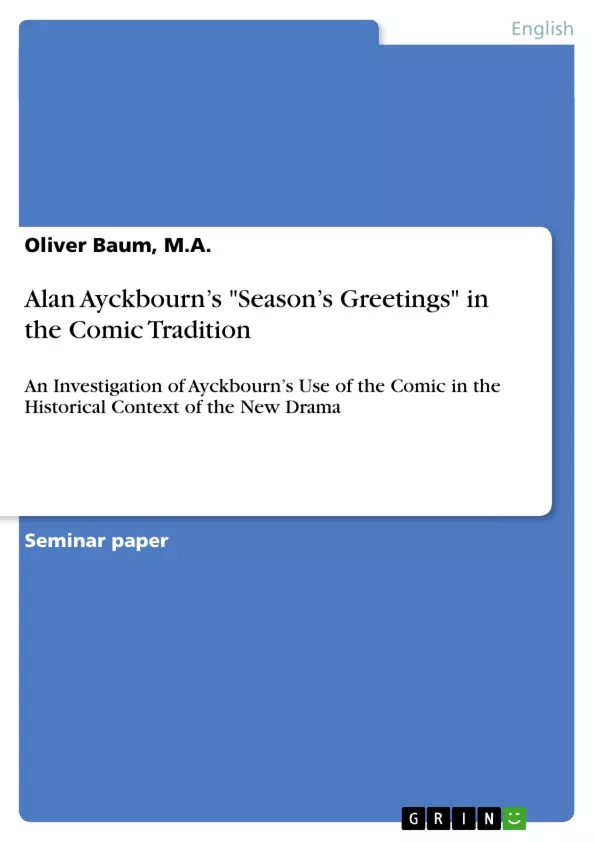This term paper deals with the placement of Alan Ayckbourn’s Season’s Greetings in the English comic tradition. Therefore, I will first put Ayckbourn’s play within the historical context of the new drama, and subsequently define the term “comedy”. Then, I will prove my thesis that Season’s Greetings matches both conventionality and innovation with regard to comedy. In this way, I will also investigate in how far Season’s Greetings as comedy contains both farcical and tragic elements, and suits other subgenres of comedy, too. Likewise, I will analyse how Ayckbourn makes use of the comic in Season’s Greetings, and discuss if he continues the comic tradition with a new emphasis with regard to the assumption that he, like Shakespeare, writes plays for the spectator rather than the reader, among other things. In the conclusion, I will recap and reconsider the principal theses of my term paper and give my own diagnosis about Ayckbourn’s drama. My thesis matters in so far that “the continuing life that […] comedies have […] justifies our study of the genre […]”. Besides, English comedy has “the longest, most continuous generic tradition in Western literature”, in which its tendency to the meta-theatrical achieves an awareness of the comic tradition onstage (cf. Leggatt 2). Anyway, it is meaningful that serious issues of everyday life are treated in a comic way.
Inhaltsverzeichnis (Table of Contents)
- Introduction
- Alan Ayckbourn's Season's Greetings in the Comic Tradition
- Season's Greetings within the Historical Context of the New Drama
- The Tradition of Comedy and Farce
- Ayckbourn's Use of the Comic in Season's Greetings
- Conclusion
Zielsetzung und Themenschwerpunkte (Objectives and Key Themes)
This paper aims to situate Alan Ayckbourn's Season's Greetings within the English comic tradition. It will analyze the play's relationship to both the conventions and innovations of comedy, exploring its farcical and tragic elements and examining Ayckbourn's unique use of comedic techniques. The paper will also consider the play's position within the historical context of the "new drama" movement.
- Placement of Season's Greetings within the English comic tradition.
- Analysis of the play's comedic elements, including farcical and tragic aspects.
- Examination of Ayckbourn's unique approach to comedy.
- Historical context of Season's Greetings within the "new drama" movement.
- Exploration of how Season's Greetings handles themes of marriage and family dynamics.
Zusammenfassung der Kapitel (Chapter Summaries)
Introduction: This section provides background information on the paper's objectives and a brief biographical sketch of Alan Ayckbourn, highlighting his career and the play Season's Greetings. It also discusses the significance of studying English comedy and its rich tradition.
Alan Ayckbourn's Season's Greetings in the Comic Tradition: This section outlines the structure of the paper's central argument. It prepares for a detailed analysis of the play within its historical and theatrical contexts.
Season's Greetings within the Historical Context of the New Drama: This chapter situates Season's Greetings within the post-war socio-political context of Britain and the rise of the "new drama," emphasizing its engagement with themes of marriage, family, and social change in the context of other works.
Schlüsselwörter (Keywords)
Alan Ayckbourn, Season's Greetings, English comedy, farce, new drama, post-modern drama, marriage, family, domestic conflict, comic tradition, theatrical innovation.
Frequently Asked Questions
How does "Season's Greetings" fit into the English comic tradition?
The play matches both conventional comedic traditions and postmodern innovations, blending farcical elements with serious social issues of everyday life.
What is the "New Drama" movement mentioned in the paper?
It refers to the post-war shift in British theatre that engaged more directly with social change, family dynamics, and the complexities of modern marriage.
Does Alan Ayckbourn use tragic elements in his comedies?
Yes, the analysis explores how "Season's Greetings" contains tragic undercurrents, particularly regarding domestic conflict and the darker side of family gatherings.
Is Ayckbourn's work intended for reading or performance?
Like Shakespeare, Ayckbourn is noted for writing plays primarily for the spectator, emphasizing the meta-theatrical awareness and the experience of the audience.
What are the central themes of "Season's Greetings"?
Key themes include marriage, family dynamics, social change, and the juxtaposition of farce with the serious issues of household life.
- Citation du texte
- Oliver Baum, M.A. (Auteur), 2007, Alan Ayckbourn’s "Season’s Greetings" in the Comic Tradition , Munich, GRIN Verlag, https://www.grin.com/document/123436



